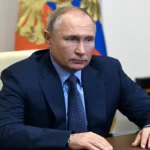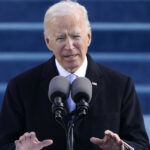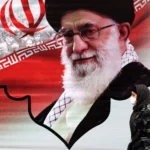On 16 June, 2015, then businessman and reality television star, Donald Trump, with his wife, Melania just in front of him, strolled down a golden elevator of his huge Trump Tower in New York City to meet with the slew of journalists, television cameras and dozens of supporters in the lobby.
There, in a 45-minute speech, Trump officially declared his bid for the American presidency for an election that would hold on November 8, 2016, then still well over 16 months ahead. Not many people would know it at the time, but that speech would define not only his campaign throughout the ensuing 16 months, but also his entire presidency for four years, ending at noon on January 20, 2021.
- 2023: A Christian Southerner must be elected for peaceful coexistence of Nigeria – PFN
- NIGERIA DAILY: The ‘Heartache’ That Valentine’s Day Causes Young People
But more significantly for my purposes here, Trump has never stopped campaigning since that fateful day. During the more than 16-month pre-election campaign period from June 16, 2015 to November 6, 2016, Trump held a total of 323 rallies. He held a total of 186 rallies for the primary season, which officially ended on July 19, 2016 when he was officially declared the Republican nominee, having already won the primaries since May 4 of that year. In addition, he held a total of 137 rallies for the general election. As President-elect and President, Trump held hundreds of “Thank You Tours” throughout until the next election in November 2020.
Nor was Trump alone. In fact, in the same 2016 US presidential elections, his opponent in the Democratic party, Hillary Clinton, had declared her bid for the presidency two months earlier, on April 12, 2015. Her campaign therefore ran for a total of 18 months to election day. And in the main election circle before that, then Senator Barack Obama had declared his bid for the office he would occupy for eight years on February 10, 2007, some 20 months before election day on November 4, 2008. So, what’s the point?
Trump’s example might be extreme, but it illustrates what in political science literature has come to be known as the state of “permanent campaign”. The idea is that political campaigns, including electoral campaigns, never really stop in a serious democracy where both the incumbent government or party and their challengers in the opposition are assumed as legitimate players in the system. The policies, programmes and projects of the incumbent government or leader are at once campaign also promises for the next election.
So too are their words, speeches, media appearances, town-hall meetings, wedding or other social attendances, and indeed, virtually everything the incumbent does or doesn’t do. Equally, so too are attacks of the same policies and programmes by the opposition parties or other challengers. This is how a truly functioning multi-party democracy operates. Former Australian Prime Minister John Howard captured this most succinctly when he said, on the very day he was first elected PM in October 2004, that he was ‘a great believer in perpetual campaigning’ and that his government’s campaign to win the next election had already begun.
In political science scholarship, a state of permanent campaign strengthens democratic practice in many ways. It is, first of all, it is an accountability mechanism in its own right: if incumbents, challengers and voters all have their eyes on the next election, then those on the saddle now are likely to take governance more seriously. It promotes voter education on concrete issues and policies, and thus encourage a policy-based politics, since there is enough time for the media and civil society to take politicians and their parties to task on policies, rather than empty political platitudes from both incumbents and challengers as we now have here.
Moreover, a state of permanent campaign strengthens opposition politics and hand electoral power directly to the people, not party bosses, who would be courted by those who aspire for office many months before election day. For a country like Nigeria, it will enable political parties to spread out their primary elections over several months, which in turn gives aspiring candidates room to properly test their electoral and fund-raising strengths, as in the US primary system which runs officially from early February to early May.
Above all, a longer and unrestricted campaign period, which in effect is what we are talking about here, is particularly well-suited for diverse federal democracies with large populations and complex political cultures like Nigeria’s. A presidential aspirant like Chief Bola Tinubu, Atiku Abubakar, Rochas Okorocha, and all others, must hail from just a small corner of the country. But to win, both within their parties and at the general election, they must sell their aspirations, visions, policies and programmes to the whole country. And yet, what works for voters in Enugu may not work for those in Calabar, Oyo, or Bauchi.
This remains true even for our national assembly and state-wide elections. So, if we are really serious about transforming our electoral space, we must all agree that presidential, gubernatorial, senatorial and other elections are serious exercises that require reasonable time and resources, and amend our electoral laws to reflect these. Presently, the Section 99 (1) of the Electoral Act 2010 stipulates that “for the purpose of this Act, the period of campaigning in public by every political party shall commence 90 days before polling day and end 24 hours prior to that day”.
Moreover, INEC, in its ‘Guidelines for Political Rallies and Campaigns’ has reinforced this crude, unnecessary and clearly un-enforceable law by defining political campaigns as the process by which “political parties and their candidates, members or supporters… publicly canvass for votes from registered voters for elective offices” through “processions, rallies, media advertisement, posters, billboards, and house-to-house contacts with voters, etc, within the time frame of 90 days” in compliance with the same section of the Electoral Act in question. By this definition, any campaigning before this 90-day period is illegal, and INEC has said so.
By this provision, Chief Bola Tinubu, Governor Dave Umahi, and Rochas Okorocha, etc, have all already violated this law. To inform the president of your bid for the presidency is to canvass for his vote, regardless of the intervening primaries, after all, the president is a registered voter. To call a press conference and recount all of that to Nigerians is also to canvass for their votes. Much the same is true of the other candidates who have flooded many cities and towns with their posters and billboards as aspirant for various elective offices.
My point, however, is that the problem here is not the aspirants but the law. This law is simply a danger for the growth of democratic practice in Nigeria and explains why in an election year, the political space remains as constricted as ever with virtually no serious campaign activities going on except in the dark of the night away from media and public glare. Given the interest and debate generated lately by the proposed amendments to the electoral act in the name of strengthening our democratic practice and political culture more broadly, this provision should have been the first to be amended. At the very least, what is wrong with a 12-month campaign period? Nigeria is not Finland or The Gambia.

 Join Daily Trust WhatsApp Community For Quick Access To News and Happenings Around You.
Join Daily Trust WhatsApp Community For Quick Access To News and Happenings Around You.


